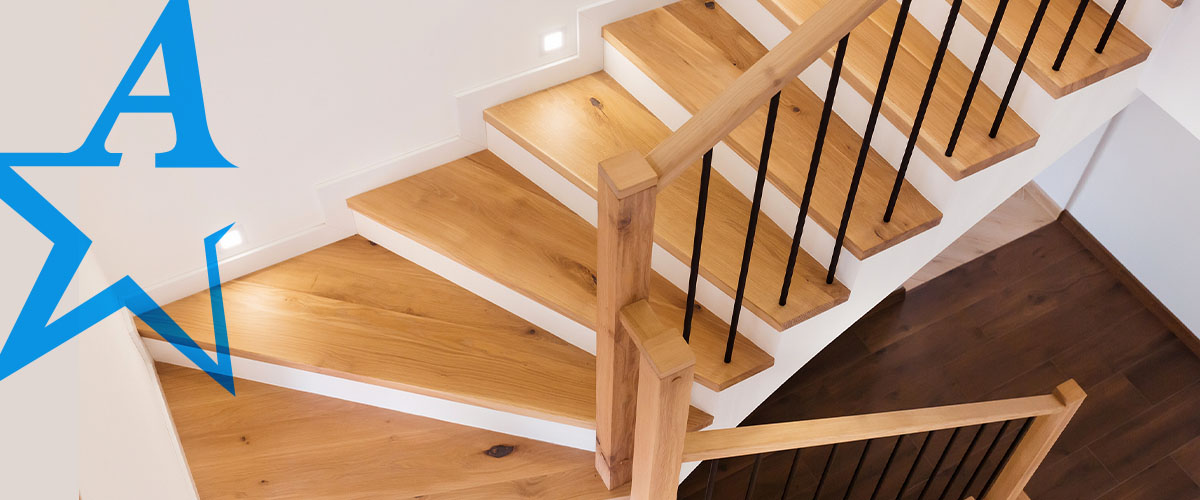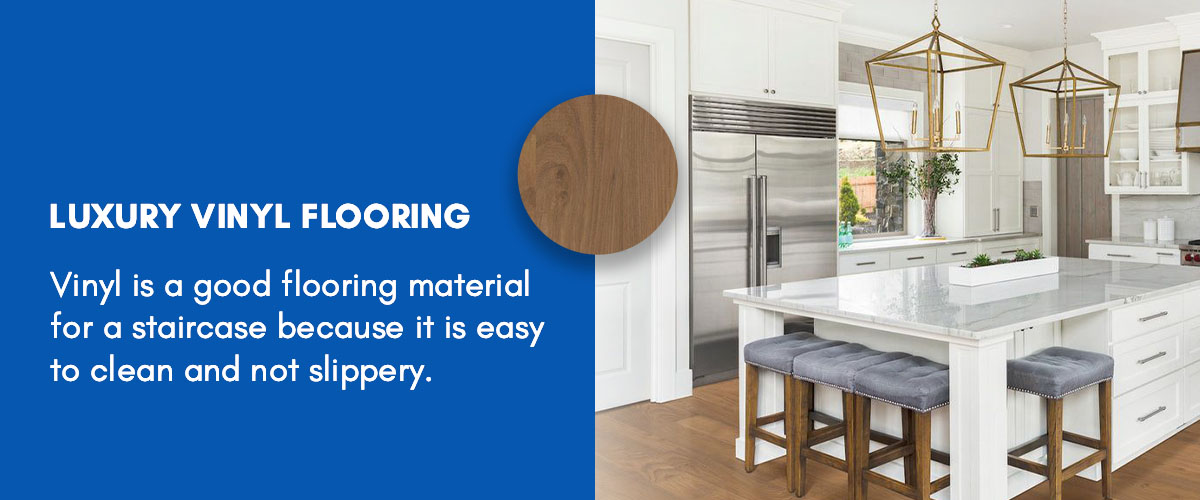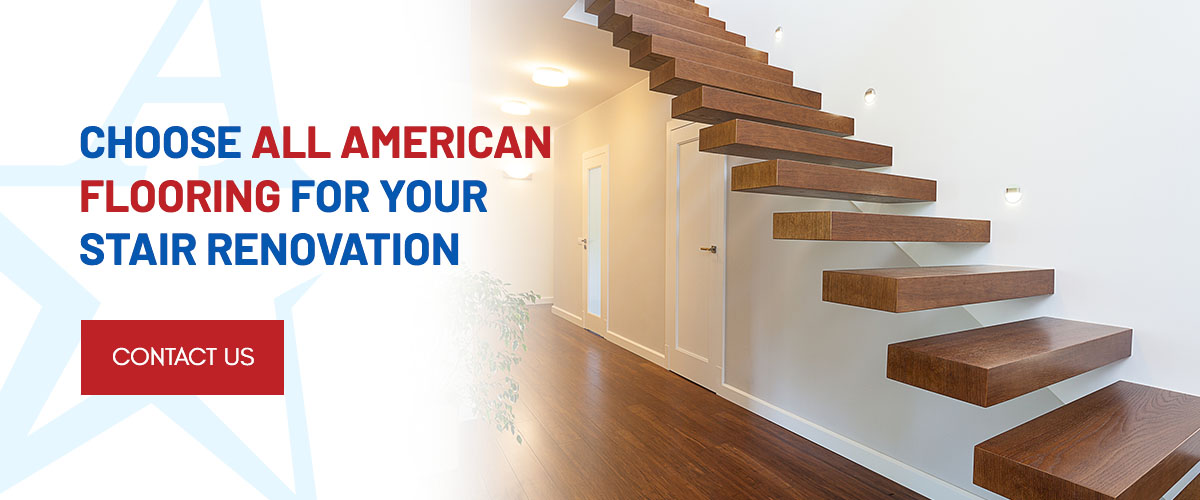The Best Flooring Options for Stairs

Staircases are more than just a means to get upstairs and downstairs — they are a focal point in any home. Dressing up the staircase with elegant flooring can transform your interior. However, staircases are usually high-traffic areas, so they require durable flooring material.
Between style and practicality, there’s a world of flooring materials to choose from.
Essential Factors to Consider for Stairs Flooring
There are various factors you should consider when renovating your staircase:
- Existing flooring: The rest of the flooring in your home may dictate the best type of material for your stairs. The steps can either flow seamlessly into the upstairs and downstairs space or separate these areas.
- Staircase design: Straight stairs, L-shaped and U-shaped stairs, winder stairs, spiral stairs and floating stairs are just some popular designs. Different materials will either complement or clash with a staircase layout.
- Costs of new materials: Staircase flooring costs can differ greatly depending on the material, size and other factors.
- Ease of cleaning and maintenance: Stair carpeting and carpet runners require routine vacuuming and occasional deep cleaning, while hardwood and laminate require careful cleaning with specific products.
- Safety and nonslip solutions: If you have children, older adults or pets, prioritize safety when replacing your stair flooring. Some flooring materials are more slippery and offer less traction. Carpet is typically a safer option than others because it offers a good grip.
- Durability: Some flooring materials offer less durability and will wear down sooner. Consider the amount of foot traffic to choose flooring that can last years.
Exploring Flooring Options for Indoor Staircases
Innovations in the flooring industry offer homeowners an extensive range of staircase flooring materials. While you can opt for any material, each comes with its own advantages and disadvantages.
Timeless Hardwood Stairs
Hardwood stairs are classical and have a timeless beauty. A wide range of hardwoods is offered at different prices to suit your budget. You can choose from a variety of tree species, including oak, maple and cherry wood. You can also consider engineered hardwood flooring, a hybrid material that uses different layers of hardwood materials. All types of hardwoods are easy to clean and maintain. However, hardwood stairs can be slippery and noisier than other options. It is also more expensive than other flooring types.
Still, hardwood is a worthwhile investment for any home. A staggering 80% of homebuyers prefer hardwood flooring. Beyond the appeal, hardwood floors can last up to a century with occasional refinishing.
Treads and carpet runners can make hardwood stairs safer and slip-resistant. Carpet runners are loose carpets that are fitted above the flooring. These carpets won’t cover the entire surface of your stairs, so the underlying flooring is still visible.
Nonslip treads are another way to add traction to slippery hardwood floors. Treads are rubber mats with an adhesive backing. They also work like runners, covering only part of the hardwood floor. This material will also reduce noise. For more effective noise reduction, you can put a flooring underlayment beneath the hardwood floor.
Stair Runner Carpet
Stair runner carpets are easy to install over any type of existing flooring. Carpets offer excellent traction as one of the safest flooring materials. Carpeting is also comfortable on the feet, and the cushioned surface acts as a soundproofing layer to reduce noise. Carpet runners are also budget-friendly.
Even though carpets require frequent vacuuming to remove dust, dirt and allergens, they offer comfort and a sense of safety. Stair runner carpets can protect the flooring below and offer a cushion in the event of a fall. While dense and woolen carpet materials can last years, you may need to replace runners routinely.
Stair runner carpets are a wise investment when choosing hard flooring for your stairs, like hardwood.
Luxury Vinyl Tiles (LVT)
If the rest of your house is wooden and you want a non-wood flooring option, consider luxury vinyl tiles. The material looks like wood, although it is more affordable while offering similar durability. Nevertheless, you can still install an LVT floor in its own right. LVTs are easy to clean and durable, and stair-sized plank designs make installation more straightforward.
Practical Laminate Flooring
Laminate flooring has become a popular stair flooring option. This flooring is durable, although hardwood floors are generally stronger. However, laminate is much more affordable, although it’s not as durable as hardwood The installation process is also cheaper.
You’ll need to avoid saturating the flooring and using abrasive and harsh cleaning chemicals. Laminate flooring is more suitable for staircases with less foot traffic.
Luxury Vinyl Flooring

Vinyl is a good flooring material for a staircase because it is easy to clean and not slippery. It is also an affordable option with an easy installation process.
There are different types of vinyl, including sheets, tiles and planks. When buying vinyl, be sure to buy an appropriate material for your stairs.
Elegant Stair Tiles
Tiling is a popular flooring option in many homes and is ideal for high-traffic areas like stairs. It is water-proof, resistant to wear and tear and boasts a long life span. It is also easy to clean tiled stairs. However, tiling is slippery, which can pose a safety risk. If all the other rooms in your house have tiles, tiling your staircase will create uniform interiors.
You can make tiles slip-resistant in several ways to prevent falls. The materials will also reduce the impact of footsteps on the stairs, making the tiled stairs less noisy. Select slip-resistant materials that are harmonious in color and design with the upstairs and downstairs flooring.
Stair runner carpets and nonslip treads are also suitable for stair tiles. There’s also the pocket-friendly option of slip-resistant floor tape. This tape provides traction to prevent slips and falls, and it’s effortless to install.
Stair edgings are another way to make your stair tiles more slip-resistant. They are metallic and work by adding texture to grip your shoes or feet. However, installing stair edging can be complicated. If done incorrectly, you might damage the stairs. It’s best to avoid designs that require screws or bolts and choose adhesive strips or options that use glue.
Choosing the Best Flooring for Your Stairs
With so many appealing stair flooring options, deciding which is best for your stairs can take time. The key is to consider the flooring throughout the rest of your home.
Ideally, if your home follows traditional interior styles, your stairs should complement the existing flooring rather than contrast the style. You can opt for different flooring materials that continue throughout your upstairs space. Choosing materials that match your downstairs area is wise to prevent separating your stairs from the rest of your home.
Some modern interior trends call for different stair flooring styles. In this case, timeless hardwood stairs can work well with classy white or gray tiling covering the rest of your home. Otherwise, comfortable carpet runners can cover hardwood stairs that lead to hardwood on the downstairs flooring.
Beyond considering your home’s style and existing flooring, durability, ease of cleaning and flooring costs are other factors to weigh.
Hardwood stairs are superior in terms of durability and a top choice when it comes to timeless aesthetics, so it’s worthwhile to invest in this elegant flooring. Hardwood is easy to clean, low on maintenance and a savvy investment that can boost property value.



